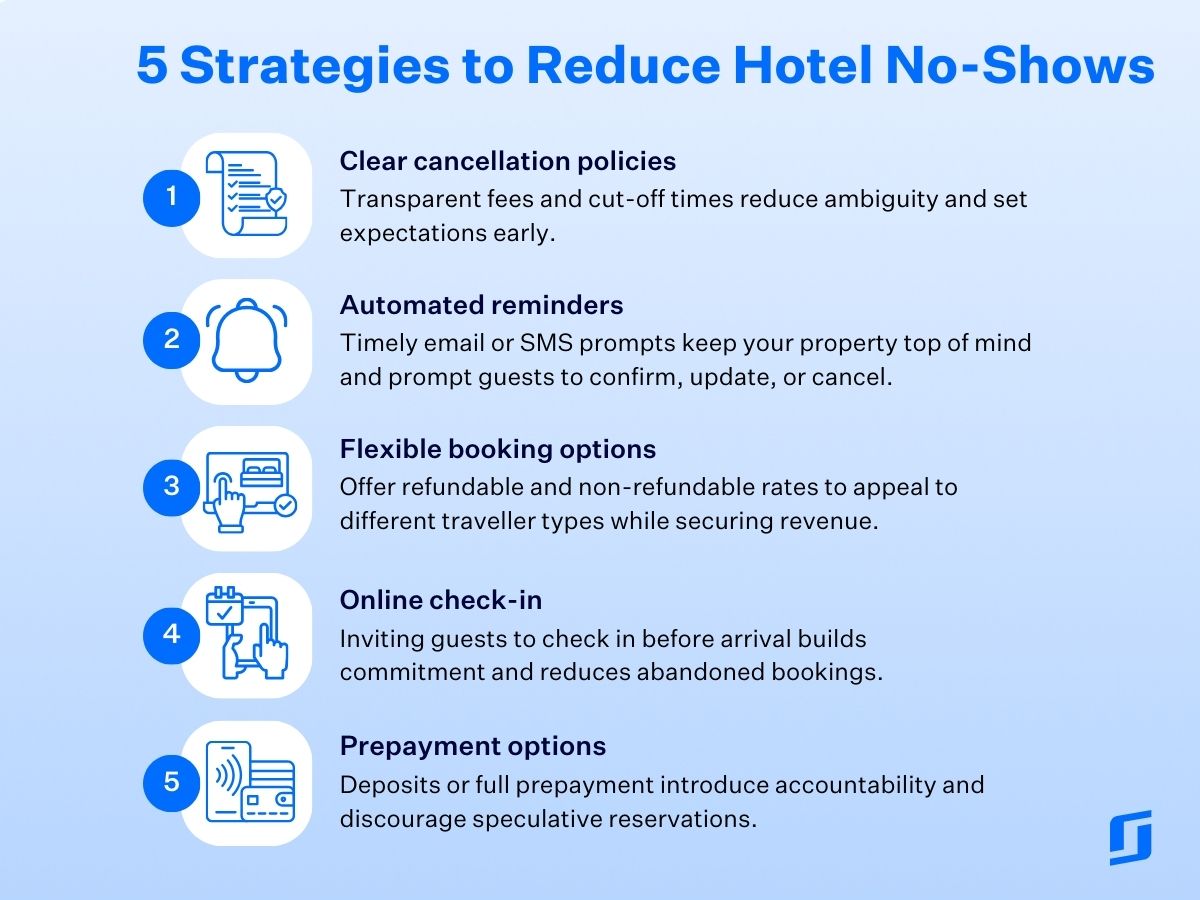What does no show hotel mean?
A hotel no-show is a confirmed reservation where the guest does not arrive by the check-in deadline and does not cancel within the permitted window. The booking remains on your calendar until you mark it as a no-show in your PMS, at which point you may apply your no-show policy, such as charging a fee or the first night.
A no-show is different from a late cancellation. With a no-show, you had no advance notice to resell the room, which is why the financial hit can be larger. The room sits idle, staff have already allocated time, and you may face payment issues if the card on file fails.
A quick example: a guest books a flexible rate via an OTA, does not cancel, and never arrives. The front desk attempts a pre-auth, which fails, and the booking is marked no-show after the cut-off. The room goes unoccupied, you lose the night’s revenue and any ancillary spend, and your team spend time chasing a declined card.
What is a ghost booking?
A ghost booking is a reservation that was never truly viable, even though it appears confirmed. It often involves fake or invalid contact and payment details, duplicate holds by shoppers comparing options, or automated bot activity. These bookings typically fail pre-authorisation or guest verification and convert into no-shows unless you catch and cancel them proactively.
Table of contents
Why do no show hotel bookings happen?
No-shows occur when guests make a confirmed reservation but fail to arrive without cancelling in advance. They are usually driven by:
- flexible cancellation culture,
- speculative bookings across multiple hotels, and/or
- changes in travel plans that guests never communicate.
In today’s booking environment, the ease of making and cancelling reservations online has created new guest behaviours, encouraging travellers to hedge their bets by booking multiple hotels at once. When they finally choose one, they often neglect to cancel the others. This practice inflates demand figures and leaves hotels holding empty rooms. It’s part of the reason why some hotels intentionally overbook their rooms, as they assume that a certain percentage of their bookings won’t actually push through.
The impact for a hotel is twofold: lost room revenue from the ghost booking itself, and the wasted opportunity to resell the space. Operationally, staff also lose time preparing for arrivals that never materialise.
For mid-sized hotel chains, the challenge can be even more disruptive. A cluster of no-shows across multiple properties can distort forecasting, push up labour costs, and complicate performance reporting across the group.
Key takeaways
- Free cancellation policies and OTA culture make speculative bookings more common.
- Guests often book multiple properties and fail to cancel the ones they don’t use.
- No-shows create hidden costs, from lost room revenue to wasted staff hours.
Take control of cancellations and no show hotel guests with SiteMinder Sync policies across every channel, capture deposits automatically, and resell released rooms instantly with SiteMinder's award-winning features.
What are common causes of no show hotel bookings?
Common causes of no-shows range from deliberate multi-booking strategies to simple oversights. Understanding these guest behaviors helps hotels design more effective preventative measures.
Many travellers create multiple reservations while comparing price, location, or amenities across several hotels. When they finally choose one property, they often neglect to cancel the others—especially when there’s no financial stake in each booking.
Some guests book speculatively while waiting on final details like flight confirmations, visas, or event tickets. If those plans fall through, the hotel reservation quietly becomes a no-show.
Ghost bookings can also arise from careless mistakes. A traveller may forget they made a reservation, double-book across different platforms, or assume the booking will automatically expire if they do not check in.
Key takeaways
- Travellers often hold multiple reservations while they compare options.
- Speculative bookings tied to uncertain travel plans easily become no-shows.
- OTA messaging around free cancellations encourages casual booking habits.
- Forgetfulness or misunderstanding of booking terms can also lead to ghost bookings.
What are ways to reduce hotel no shows?
Every empty room from a no-show is lost revenue you can never recover. The good news is that you can take proactive steps to lower the risk, combining clear policies with the right technology to make guests more accountable and engaged before arrival.

The scale of hotel no-shows: Industry data
- In some geographies, cancellations can reach 40% on major OTAs like Booking.com, highlighting the need for stricter safeguards.
- City hotels record cancellation rates close to 40% compared with 28% for resorts, showing how location and guest type influence risk.
- Guaranteed bookings backed by a credit card or deposit have been shown to cut no-shows to around 5%.
While strategies vary by property, some foundational steps work for practically any operator:
Clear cancellation policies
Transparent policies reduce ambiguity and set expectations early. Guests who understand fees and cut-off times are less likely to leave bookings unattended. Even if they do cancel, if you can ensure that this happens ahead of time, you may be able to fill that now-empty room with a guest from a late or last-minute booking.
Automated reminders
Sending timely reminders through email or SMS keeps your property top of mind. A quick message can prompt travellers to confirm, update, or cancel, freeing up inventory if they no longer plan to arrive.
Flexible booking options
Giving guests the choice between refundable and non-refundable rates appeals to different traveller types. Non-refundable rates provide revenue security, while refundable options maintain appeal for those seeking flexibility.
Online check-in
Inviting guests to check in online before arrival builds commitment. Once a traveller completes this step, they are far less likely to abandon the booking.
Prepayment options
Requiring deposits or prepayments introduces accountability. Even a partial payment reduces speculative reservations and discourages ghost bookings.
Key takeaways
- Clear policies and reminders help guests act before a booking becomes a no-show.
- Flexibility paired with prepayment options balances guest choice with hotel protection.
- Online check-in and guaranteed bookings strengthen commitment and reduce risk.
How to create a hotel no show policy?
A hotel no-show policy sets out what happens when a guest fails to arrive without cancelling in advance. It should define, at a minimum:
- the charges applied,
- the cut-off time for arrivals, and,
- the process for updating room availability, ensuring consistency across every booking channel.
A strong no-show policy helps prevent misuse of your booking system and gives staff a clear framework for handling absent guests. For hotels operating across multiple OTAs, aligning policies is essential. Discrepancies between channels can confuse travellers and increase disputes.
When creating your policy, start with fairness and transparency. Guests should know in plain terms what the financial consequences are if they do not show up. For example, many hotels charge the first night’s stay, while others apply a flat fee or a percentage of the booking value. This clarity discourages speculative reservations and builds trust with genuine travellers.
Consider how flexible or strict you want the terms to be. Offering refundable and non-refundable options lets guests choose their level of commitment. Adding deposit or prepayment requirements strengthens enforcement, especially in high-demand periods or for group bookings.
Ensure your PMS automatically updates room status when a booking is marked as a no-show. This keeps your reporting accurate and, in some cases, allows the room to be resold the same night if it becomes clear the guest is not arriving.


